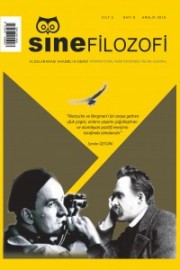Kuşku ve Empati: Kartezyen Teori Bağlamında “Blade Runner 2049”da İnsan Felsefesi
Suspicion and Empathy: Human Philosophy in “Blade Runner 2049” in the Context of Cartesian Theory
Author(s): Mikail BozSubject(s): Philosophy, Early Modern Philosophy, Film / Cinema / Cinematography
Published by: Serdar Öztürk
Keywords: Cartesian philosophy; subject; suspicion; paranoia; Denis Villeneuve; Blade Runner 2049;
Summary/Abstract: In this study, Blade Runner 2049 (2017), directed by Denis Villeneuve, is analyzed within the context of the Cartesian methodic doubt, self, consciousness and human philosophy. The quest put forward by the film, the attitude towards the solution of this quest, the thesis highlighted and the layers of the philosophical frame surrounding them were tried to be revealed. The Cartesian philosophy offers a methodological skepticism that is directed towards purifying all suspicions. Thus, an unquestionable soul, or subject, is built upon and the material world is conceived by virtue of the specific relationship of the subject with God. In this case, that kind of problem arises. How does subject recognize and portray itself and others? How to define the other not as automat or Android, but as the specific limit of what is defined as human? The “blade runner” android K., who identified human essence with their empathy ability, offer the opportunity to study a suspected subject, gradually losing its anchoring points. The relationship of this subject with the creatures and the creator, the new space in which the identity and the self is built, shows the suspicion as the most important element in the foundation of a paranoid individual type. The general quest in the film is to see if an egalitarian relationship between self and the other can be established and an answer it must be established. The film has an affirmative attitude to this answer. The thesis of the film is that quest, suspicion, compassion and pain are essential elements in the construction of the self. A dystopic, colonialist and authoritarian administrative framework is presented. The film provides an important basis for the construction of identity, with a paranoid and schizophrenic suspicion and a natural empathy ability.
Journal: SineFilozofi
- Issue Year: 4/2019
- Issue No: 8
- Page Range: 320-337
- Page Count: 18
- Language: Turkish

